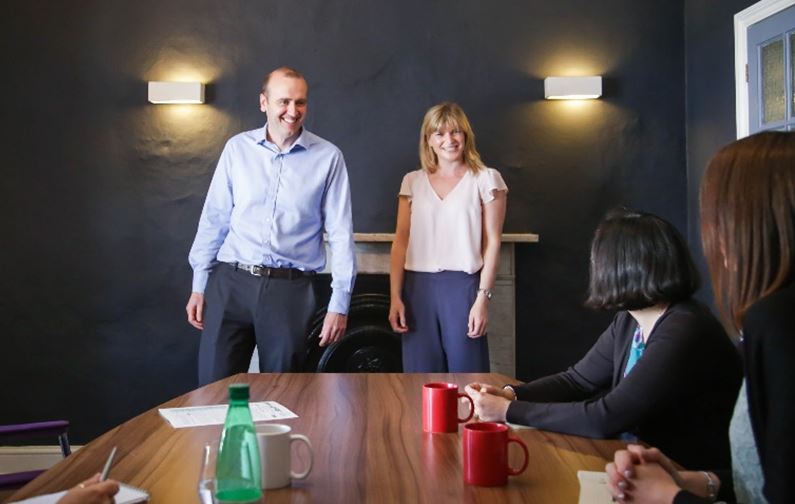In my “Five Tips for Beating those Nerves” blog, I talked about Rob, one of my clients who told me this:
“Going in to the meeting, my manager asked if I would wrap up the session with a few words at the end, to sum up our discussion points. My stomach dropped, and I instantly felt sick. I couldn’t listen to anything being discussed during the hour-long meeting, because all I could think about was how terrified I was, and I spent the whole hour working myself up in to a frenzy. I did it, but I did it badly, and I knew then that I would never be asked to do it again”.
Rob’s problem was nerves. Like many of us, he had a huge fear of public speaking, and that fear was holding him back. He knew that, until he addressed that fear, he would be overlooked when it came to presenting at work, and this would have ramifications for his career progression.
But another client, Katie, didn’t share those nerves. She was more than willing to get up in front of people; she was comfortable in every public speaking scenario….but still, something wasn’t working. After spending time together and reviewing some of Katie’s recent presentations, it was clear that the content of her presentations was what was lacking. Katie was charismatic, ambitious and very likeable, but her weakness in crafting a brilliant presentation was holding her back.
A 2017 survey by Logitech found that 62% of professionals in the UK believe their salary would increase if they were a better speaker. 57% had turned down a public speaking opportunity because they didn’t feel they were good enough, and 66% agreed that someone with poor presentation skills could never be in an executive role in their company.
Clearly, arming yourself with a great set of presentation skills will put you head and shoulders above your colleagues.
Public speaking undoubtedly plays a role in our career progression. When we put ourselves out there, and become a recognisable face in our business, we naturally become known to people. If we’re able to get up there and confidently present to people, our colleagues will start to acknowledge our talent; our managers will start to learn our name; we will give the impression that we’re confident, knowledgeable and ambitious.
Think of two people you work with. One – let’s call her Helen – is diligent, committed and hardworking. She keeps her head down, meets her targets and quietly gets on with her job. Helen is an introvert; she never goes out for work drinks, she rarely interacts with her colleagues and she most certainly doesn’t put herself up for any presentation opportunities.
Now let’s talk about Mark. Mark is a really friendly, charismatic, confident guy. Whenever you bump in to him, he’s always up for a chat, and he always takes time to greet his junior colleagues. He has great communication skills. Mark doesn’t always meet his targets and, hey, sometimes he misses his deadlines, but he’s really popular in the office and willingly participates in presentations, seminars and team meetings. Everyone knows Mark – especially the senior management.
So, who is going to progress more quickly?
No brainer. It’s Mark. Mark might not be technically as competent as Helen, but no one really even knows Helen is there.
Great presentation skills make you visible, and have an impact. They show that you’re a leader, and that you can communicate. And if you have the skills to communicate in the business world, that world is your oyster: people do business with people they like, that they can see themselves in and be excited by.
The fact is, to do well professionally, you must be able to communicate brilliantly. And public speaking plays a really important part in this. We might not all find this easy, but it’s a skill we can learn. Presentation skills training enables us to learn to communicate an idea effectively; to encapsulate our message and plant that message in the mind of our listener. If you can learn to do this brilliantly within the time constraints of an effective presentation, you will have the skills to communicate your ideas effectively in any scenario, from a team meeting, to a written briefing, to a quick chat with your manager by the coffee machine.
Not to mention the fact that many job interviews now involve a presentation to the panel. You might have the most attractive CV in the world, but you won’t get the offer if you don’t nail your presentation. And even if you don’t have to give a presentation, you’re still “presenting” yourself: you have to sell “you”, and you don’t want to let yourself down.
By learning to improve your public speaking skills, you will give yourself the tools you need to pull out of the bag in any situation. The world moves fast, and we may be called on at any moment to give an impromptu talk. The more we do it, the less fazed we are, and the more confident we feel to get up there and shine.
So, if we accept that we have to get up there and do it, why not learn to do it brilliantly. Let’s talk about what I can do for your presentation skills.
Get in touch to learn more about how I can help you conquer your fear of public speaking.

